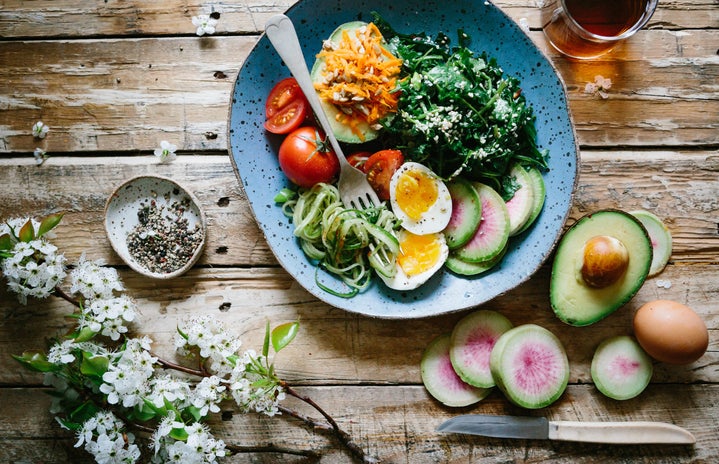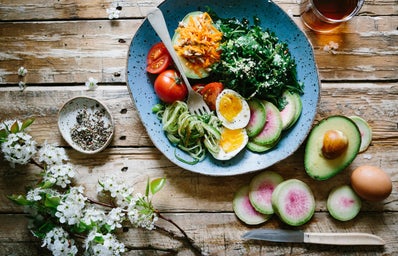Bucknell University is home to twenty-seven varsity Division I sports teams, one of the biggest and most diverse athletic programs in the nation. At the heart of every athlete at Bucknell is endless hours of training, film work, and most importantly: food.
But you don’t have to be an athlete to fuel your body with nutritious food or work out for hours every single day to feel like you earned that slice of cake after dinner. There is a science behind fueling the system that allows you to wake up and walk around campus every single day. I sat down with one of the head strength coaches at Bucknell, RC, to dive deeper into what it means to eat nutritiously without feeling guilt or cutting out your favorite treats.
Lysette Rivera Cortes (RC) has been working at Bucknell for just over a year as one of three strength coaches for varsity athletes. She has a master’s degree in exercise science, is certified in nutrition and strength expertise, and has been a collegiate strength coach for six years. She was a college athlete herself, which is what got her interested in nutrition in the first place.
One of the first things I inquired about was how someone decides that a “diet” is right for them. How does someone even get started? RC likes to respond by asking questions back to the person considering a diet: why do you want to go on a diet? What kind of diet and how long? Is this temporary or a full-blown lifestyle change? She went on to highlight the ways in which a lifestyle change could be more beneficial and have a longer lasting impact on someone than if they simply changed their eating habits for a couple of weeks and then reverted back to their original diet.
In regards to getting started, RC talked a lot about mindset. Someone may want to change their diet, but if their mindset about the food they eat and their consumption of it does not change, it may not be as effective. When talking about the different ways that a lifestyle change would be implemented, RC stressed the importance of surrounding yourself with people who have like-minded goals and support the decisions you make in regards to diet. Eliminating toxicity is something that most definitely needs to be cut out.
In regards to “cutting out” foods, RC said that it is not required for someone to successfully implement a lifestyle change. She spoke in particular about moderation. Everything—even the cookies on the counter—can be eaten as long as there is a sense of control when it comes to the amount of “junk” being consumed. And yes, she did agree that junk food is a real thing. There are foods that genuinely provide no nutritional value to our bodies. This fact does not mean they are not yummy, which is why it is okay to eat them. In fact, RC noted specifically that limiting yourself to not eating the foods that you want can lead to a new diet not only being harder but also provoking guilt with every meal and snack.
This guilt may not necessarily be from cutting foods out of a weekly menu but also from social media, friends, and family that have been misinformed about what is deemed “right” and “wrong” for your body. Social media can be a tool that is highly beneficial to anyone getting started in learning to change their eating habits and mindset about food, however there is an abundance of misinformation to weed through. Referencing credible resources as well as following verified people (like RC, whose Instagram is linked below) can be incredibly helpful to anyone looking to get started.
When asked about what the ideal plate for anyone—not just athletes—looks like, she said, “Carbs. Fat. Protein.” Although often thought of as unhealthy, there are a variety of essential fats (some of which can be provided via peanut butter, avocado, etc.), carbohydrates that are used for quick energy such as pasta and rice (white or brown: “there is literally no difference”), and proteins such as chicken, turkey, and lean meats. And, of course, the one food group which many find difficult…vegetables. One to two handfuls of veggies need to be present on the ideal plate.
But how does a strapped-for-cash-college-student access this ideal plate? How does a working single mom have time to make herself and her kids the food that will lead them to success in the long run? This is where RC mentioned the idea of convenience and effectiveness. Although it might seem like a great idea to suddenly go to Whole Foods and buy tons of fresh produce, that is expensive and not time permitting. RC claims this is where “knowing your body” comes in. Someone who wants to change their eating habits does not have to completely cut out carbs or run to the store and only buy produce. Eating nutritiously can mean eating foods that keep your energy stable throughout the day, meal prepping on Sundays, and planning meal times around work hours.
In all honesty, “eating healthily” can have completely different meanings to each person. All it takes is some mental work, a little bit of time, and a LOT of moderation.
RC’s Insta: @coach_rc_


